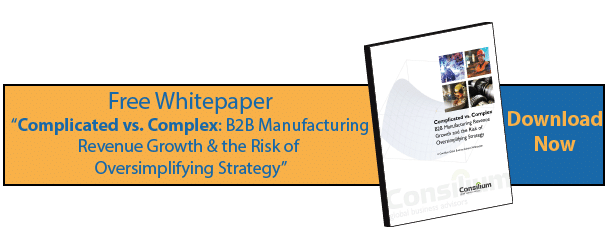"In 2015 we'll see the continued shift away from transactional marketing, with a 'click' as the point of interaction, to a new era of engagement marketing, where marketers focus on engaging people at a personal level, continuously over time, and accross all channels and experiences." Sanjay Dholokia, Marketo CMO, Marketo's 2015 Marketing Predictions
The challenge of industrial marketing
Manufacturing companies are in a tough spot. On the one hand they've got buyers who increasingly expect tailored, personalized information that will make them more effective professionally. On the other hand prospects are often digging around for that information long before they're qualified leads...and even longer before they're willing to entertain a sales rep conversation.
In other words companies must create a more personalized experience for the buyers journey while having far less personal insight accumulated through rep-prospect interaction. It feels like an intractable revenue growth challenge for most companies - and that leads to a common reaction of discounting their observation to allow them to delay confronting the challenge.
That's never a recipe for success.
Simple solution hides behind absurd name
The good news? There's a viable of-the-shelf solution for this industrial marketing challenge. The bad? It's hidden behind an absurd name.
"Marketing Automation"
Cool buzzword, but what does it mean? What does it do?
Like many things in business, and particularly in software and technology, if it's implemented for the sake of another tool, it probably does very little except waste money and time. Honest answer.
However, it provides an important capability if done well. There are certain companies that can substantially improve their industrial marketing by implementing marketing automation. Key attributes of companies that stand to benefit include:
- well defined sales process
- clear understanding of prospects' business models and how their product / service enhances prospects' businesses
- empathy and willingness to interview prospects, buyers, customers and lost deals to learn much more about the buying journey
- a commitment to rigorously understanding the complexities of the 3D buying journey
Companies that fit this profile can often successfully translate the traditional sales process into its component steps and create a virtual, information/content based buyer experience that replicates the series of 'yeses' which they learned fostered offline sales success.
Marketing automation provides the framework that allows them to:
- automatically provide very tailored, even personalized, resources to prospects
- manage a huge volume of early stage, unqualified leads without overwhelming direct sales resources
- support prospects' desire to research and learn unmolested by quota carrying sales reps
Progressive profiling
There's another term that is tossed around too often and too casually by marketing types. Progressive profiling is the ability to become gradually more acquainted with a prospect....virtually. This is critical to industrial marketing for complex B2B sales. Here's the premise.
Typically a prospect will be willing to share a couple bits of information in exchange for access to your content which they believe will help them solve a problem. For example, First, Last name & email address are a common, and acceptable exchange for decent content. But aside from the opportunity to use that to mine LinkedIn, it tells you very little about the prospect that will allow you to provide them information which will strongly resonate.
You'll need to know things like:
- industry
- job function (e.g. engineering, purchasing, finance)
- job title
- company size
in addition to telephone number, location and other admin details.
But ask that all at once and nobody will share it. Instead, by asking gradually, and even automatically only asking three to five questions at a time (by tracking what you know already and only asking new questions) over the course of several interactions you can become reasonably familiar with a prospect - at least enough to begin to segment them automatically to begin to provide tailored information. And that tailored delivery can range from simple steps like providing specific information by email to more sophisticated approaches like showing different prospects completely different information when they hit a given page on your website.
Sell to 10 different industries with very different challenges? Why would you dilute your message for a time pressed engineer seeking viable technical solutions by forcing them to interpolate how your capability in steel fab might apply to their requirement in pharmaceutical processing?
Achieving revenue growth scale
This is a bigger topic, though, than how to provide more personalized information to a prospect. In today's fast paced, competitive, global markets, industrial marketing has a responsibility to create and nurture thousands, and tens of thousands, of virtual early stage lead relationships. Sales can't - and even if they could prospects don't want to deal with them. Saturday mornings with tablets; graveyard shift after one crisis too many; or coming out of a staff meeting after getting barked at to fix a problem - buyers are hunkered down looking for their own solutions at a time that works for them.
It's time to help buyers buy. And that requires solutions to help scale personalized prospect relationships.
To learn more about the complexity of today's markets and how to structure effective programs to thrive, download our free whitepaper.

